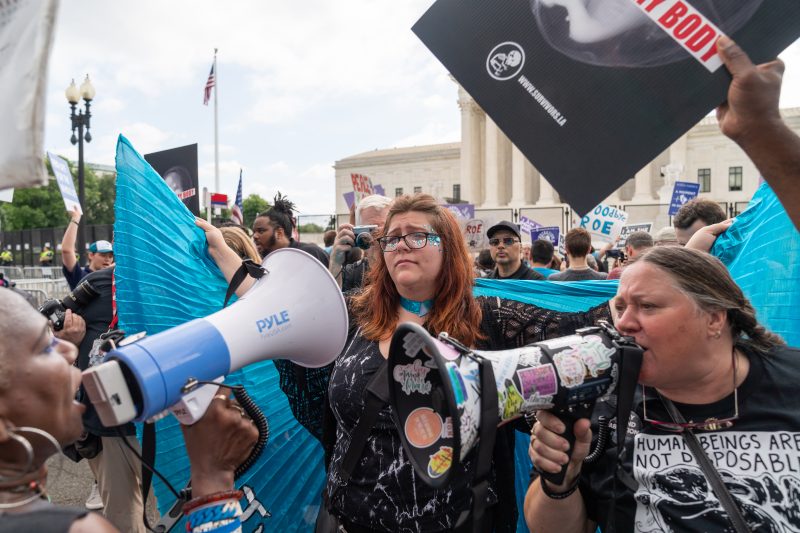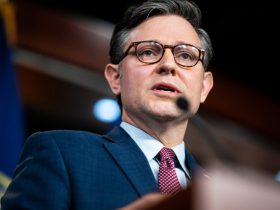In August 2020, a group of antiabortion protesters sat in front of the doors to an abortion clinic in Sterling Heights, Mich., singing Christian hymns and refusing police orders to move.
They were arrested for trespassing, a misdemeanor.
Then, in February, the Justice Department announced a federal indictment in the case that could send some of the protesters to prison for up to 11 years.
They were charged under the Freedom of Access to Clinic Entrances Act, a 1994 law that Attorney General Merrick Garland has called a key tool in the Biden administration’s efforts to protect reproductive rights in the face of tightening legal restrictions for women seeking abortions.
Some conservative groups, Republican lawmakers and defense attorneys have rebuked Garland, accusing the department of going too far in aggressively pursuing members of antiabortion groups who have not necessarily been dangerous. They say authorities are ignoring similar threats and vandalism at Catholic churches and reproductive health centers that counsel women against abortion.
But federal authorities and abortion rights groups said harassment, stalking and intimidation at abortion clinics have escalated since the Supreme Court’s decision in the Dobbs case in June 2022 overturned Roe v. Wade — the court’s 1973 decision recognizing the federal right to an abortion. That behavior, they argue, has made the Justice Department’s push for federal charges that come with harsh prison penalties more urgent.
Even as he and his aides have touted the prosecutions as a response to the Dobbs decision, Garland has defended the agency’s approach, saying the Justice Department and FBI are investigating disruptive acts on both sides.
“We prosecute without respect to ideology,” he said at a Senate hearing in the spring, “but we do focus on the most violent acts, the most dangerous actors and the cases most likely to lead to danger to most Americans.”
Federal authorities are prosecuting several allegations of extremely dangerous behavior at abortion clinics that go well beyond being disruptive. Among the examples are cases involving charges that a man threatened to burn down an Ohio abortion clinic last year, that a man set fire to an Illinois clinic in January and that three men conspired to firebomb a California clinic in March.
The indictments do not link the men in those cases to organized antiabortion groups. The defendant in the Illinois case, Tyler W. Massengill, pleaded guilty and was sentenced in August to 10 years in prison and ordered to pay $1.45 million in restitution to the clinic.
Since President Biden took office in 2021, the Justice Department has brought 2o criminal prosecutions and one civil case under the FACE Act against a total of 46 defendants, according to federal officials, with all but one of the cases involving charges for disruptions at abortion clinics. That one exception is a criminal case against four abortion rights activists accused of spray-painting threatening messages last year at three Florida reproductive health centers that counsel patients against abortion.
Decrying what they view as an imbalance, Rep. Chip Roy (R-Tex.) and Sen. Mike Lee (R-Utah) introduced legislation in September to repeal the law. Roy accused the Justice Department of having “brazenly weaponized the FACE Act against normal, everyday Americans across the political spectrum, simply because they are pro-life.”
“I certainly believe the undercurrent to all of this was a pushback on Dobbs,” said Bradley Friedman, an attorney for Chester Gallagher, 74, one of eight people charged in the Michigan case involving the antiabortion protesters who refused to move. “All this is, is criminal trespass. If the owner of a business does not want someone on their property, they can ask them to leave.”
Prosecutors said the protesters in Michigan blocked a patient, an employee and the clinic’s owner from accessing the building. Two of the eight defendants are facing an additional count of allegedly obstructing another Michigan abortion facility in April 2021.
Obstructions at clinics across the United States rose from 45 in 2021 to 287 last year, while stalking incidents rose from eight to 81, according to the National Abortion Federation’s annual survey. There were also increases in bomb threats, burglaries and assaults.
The federation found that, after Dobbs, abortion opponents have shifted attention to states that maintain broader protections, including California, Colorado, Illinois, Michigan, Nevada, New Jersey, New Mexico, Massachusetts and Oregon, as well as Washington, D.C.
Federal prosecutors have responded by pursuing a growing number of cases, with harsher potential penalties. In those involving organized groups, including in the Michigan case, authorities have pursued a new tactic of adding civil rights conspiracy charges, which can increase prison sentences by up to 10 years.
This summer, federal prosecutors won FACE Act and conspiracy convictions against eight people for illegally entering and disrupting an abortion clinic in Washington, D.C., in October 2020. Another defendant in the case pleaded guilty in March, and a 10th defendant is set to stand trial this month. Sentencing for those already convicted is pending.
The leader of the protest, Lauren Handy, who was found guilty at trial, kept five fetuses in a rowhouse on Capitol Hill where she had been living, authorities said. Handy’s group, Progressive Anti-Abortion Uprising, suggested the fetuses came from illegal abortions. But D.C. government officials said they were aborted in accordance with city law.
“What providers have to face every day is being targeted by people coordinating across the country,” said Melissa Fowler, the National Abortion Federation’s chief program officer. “It’s completely appropriate that the Justice Department is recognizing this and charging people. We know historically that people will escalate their behavior.”
Republicans on Capitol Hill have accused the Justice Department of failing to investigate threats against churches and antiabortion pregnancy centers, which are also protected under the FACE Act.
There have been 196 attacks on Catholic churches since the Dobbs decision, according to CatholicVote, including graffiti of satanic messages, rocks and bricks thrown through windows and desecrated statues.
Conservative media, top Republicans in Congress and abortion opponents also have pointed to the case of Mark Houck, who was acquitted in February on FACE Act charges that he twice assaulted an abortion clinic escort in Philadelphia in October 2021.
Before the federal trial, local prosecutors dropped state charges against Houck — a Catholic “sidewalk counselor” who sought to talk women out of abortions — after the escort he was accused of assaulting failed to appear at court hearings. Houck has said the physical altercation occurred after the escort aggressively approached his teenage son.
“The pro-life movement sees this as a targeting of their movement unjustly,” said Peter Breen, executive vice president at the Thomas More Society, a nonprofit law firm that represented Houck and is representing defendants in other FACE Act cases.
Republicans have repeatedly lambasted the Justice Department for prosecuting Houck. At a House Judiciary Committee hearing in September, Roy asked Garland whether doing so was a waste of Justice Department resources.
“The Justice Department respects the jury’s verdict,” Garland responded. “The decisions in that case were made by agents and prosecutors on the ground.”
Federal authorities have said the Justice Department and FBI are investigating threats and disruptions at antiabortion reproductive centers. But they said those cases are more difficult to prosecute because — unlike antiabortion protesters who live-stream their activities and stage sit-ins — people who vandalize antiabortion pregnancy centers have sought to remain anonymous, taking covert action when witnesses may not be present.
In January, the FBI offered a $25,000 reward for information about arson cases at three antiabortion pregnancy centers in Portland last year. Police said the fires were started with molotov cocktails; graffiti at one location read: “IF ABORTION AINT SAFE NEITHER RU.” The FBI cited 10 unsolved attacks on antiabortion centers in 2022.
Congress approved the FACE Act after nearly two decades of escalating violence at abortion clinics, including firebombings, arson and the fatal shooting in 1993 of David Gunn, a physician in Pensacola, Fla. The law has both criminal and civil provisions, and it allows state prosecutors and private businesses to file lawsuits independent of the Justice Department.
The FACE Act has been successful in reducing the more extreme tactics that antiabortion activists used in the 1980s and early 1990s, including mass blockades involving hundreds of protesters and vehicles barricading clinic entrances, said David S. Cohen, a law professor at Drexel University.
He said the law has been less effective, however, in stopping lower-level forms of protest, such as clinic invasions and trespassing: “Convictions have been harder to get and police are more likely to say, ‘Just leave and it’s okay because there’s no real harm.’”
During the Trump administration, the Justice Department pursued eight criminal prosecutions, and one civil case, under the FACE Act. Garland signaled that federal authorities would prioritize such cases after the Texas legislature passed an abortion ban at six weeks of pregnancy in September 2021.
“The department will provide support from federal law enforcement when an abortion clinic or reproductive health center is under attack,” Garland said then.
Justice’s caseload began to grow. In early 2022, federal prosecutors charged Handy and others in the D.C. clinic case. In October 2022, a federal grand jury indicted 11 people for blockading a clinic in Mt. Juliet, Tenn., a year earlier. And in February, the Justice Department charged the eight people in the Michigan clinic case.
The federal indictments describe the defendants as recruiting participants and coordinating their actions through social media posts and cellphone conversations.
In each incident, many protesters traveled far from their home states to participate. Some took part in more than one of the demonstrations. Heather Idoni of Michigan was charged in all three incidents; Gallagher, of Tennessee, was charged in both the Michigan and Tennessee cases.
During the disruption at the Tennessee clinic, according to the indictment, Gallagher used a Facebook live stream to described the protesters’ actions as a “rescue” and said the goal was to “stop as many murderous appointments as we can.”
“What we’re faced with is individuals who will stop at nothing to disrupt our operations,” said Dipal Shah, chief external affairs officer at Planned Parenthood of Greater New York. “Now more than ever, since the fall of Roe, statutes and legislation like the FACE Act should be used to ensure safe and dignified access.”
In September 2022, federal prosecutors filed FACE Act charges against Christopher Moscinski, a Franciscan friar, for allegedly attaching padlocks to the gates of a Planned Parenthood clinic in Hempstead, N.Y., and lying down in front of it to block access.
He was convicted and sentenced in July to six months in federal prison. That same month, New York Attorney General Letitia James filed a state-level FACE Act lawsuit against members of the antiabortion group Red Rose Rescue, including Moscinski, charging that their aim was to “terrorize” staff and patients at Hempstead and two other clinics.
Monica Migliorino Miller, director of Citizens for a Pro-Life Society, an affiliate of Red Rose Rescue, said the organization’s actions are nonviolent and peaceful.
Fowler, from the National Abortion Federation, said abortion rights activists believe the law is just as relevant now as it was three decades ago.
“We hope,” she said, “that some of the higher-profile prosecutions and convictions send a message to people that this type of criminal activity will not be tolerated.”








